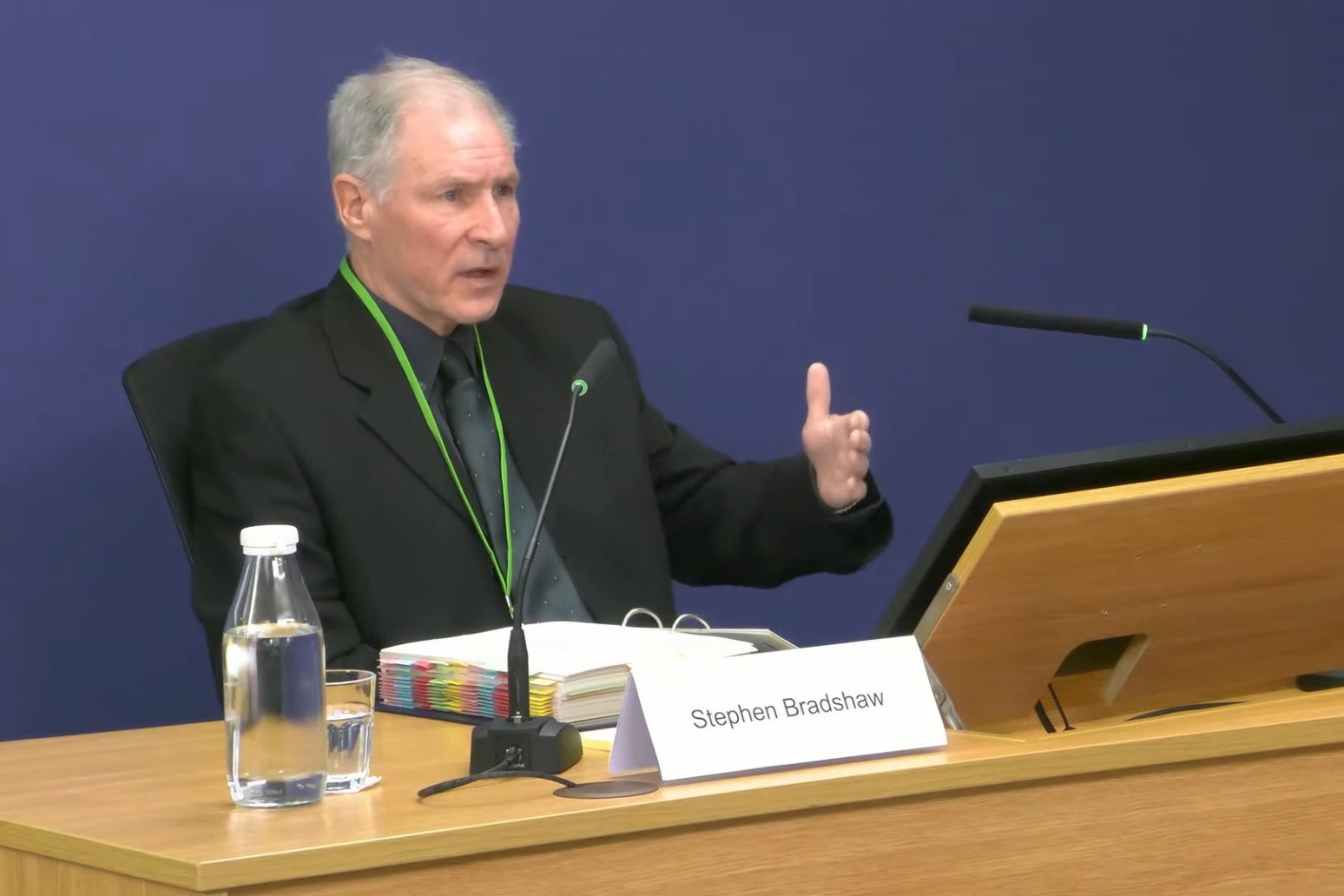
Stephen Bradshaw claimed her attribution of blame to the Horizon system “would given credence” to the subpostmasters’ campaign for justice.
A Post Office investigator challenged lawyers who accepted a subpostmistress’s denial of theft because her attribution of blame to the Horizon system “would given credence” to the subpostmasters’ campaign for justice.
In a “self-appraisal” form written by Stephen Bradshaw for the business year 2010/2011, he said his reasons for continuing to trial for Jacqueline McDonald were because “the integrity of the Horizon system was in question”.
He denied he was “proud” of ensuring there was no credence to the former subpostmasters’ campaign while giving evidence to the Horizon IT inquiry on Thursday.
In the document titled Review Of Behaviours, Mr Bradshaw was referring to the case of Ms McDonald, who accused the investigator of behaving like a “mafia gangster” looking to collect “bounty” from subpostmasters through “threats and lies”.
Referring to what he had told the lawyers, the document read: “I challenged their reasoning for accepting only a guilty plea for false accounting and not one for theft.
“I explained the reasons for continuing with a trial for theft (the integrity of the Horizon system was in question) and that problems would occur for future cases.
“The defendant denied theft and the money was missing due to the Horizon system and if this was accepted then this argument would give credence to the current campaign by former subpostmasters.”
Tim Moloney KC, who represents Ms McDonald, asked Mr Bradshaw: “You were very explicit there, Mr Bradshaw, about your motives in seeking to ensure that no credence was given to the subpostmasters’ campaign, weren’t you?”
Mr Bradshaw replied: “No. As I said and I explained earlier, that’s a…”
Mr Moloney interjected: “A flamboyant way of explaining what had gone on on the day.”
Mr Bradshaw said: “Of course, yes.”
Mr Moloney continued: “It can’t be, can it? Because that is a motivation, it’s not a fact.
“In fact it’s clear from the document that ensuring that no credence was given to the former subpostmasters’ campaign was something you were proud of, wasn’t it Mr Bradshaw?”
The investigator replied: “No, it wasn’t. As I said it’s a flowering way of putting your one-to-one type notes.”
Mr Blake questioned Mr Bradshaw over whether he believed it was “career-boosting” to continue the case against Ms McDonald, after he could be seen suggesting her queries over Horizon’s integrity would have a “wider impact on the business”.
Mr Bradshaw responded: “The issue would have been discussed with the prosecution barrister – as you’re well aware, when you’re filling in one-to-ones, there’s always a flamboyant way of putting the words across.”
In his evidence, Mr Bradshaw admitted it was “probably not” acceptable that another subpostmistress, Katherine McQue, was offered a plea deal provided she did not blame the Horizon system.
Mr Bradshaw was shown a memo he had been copied into in 2011, dictating that an indication had been given to the subpostmistress that a guilty plea to fraud was acceptable “so long as the defendant stipulated … there was nothing wrong with Horizon”.
Questioning the witness on the document, counsel to the inquiry Julian Blake said: “Do you think it’s appropriate for the Post Office to say to a defendant that we might accept the second count on the indictment as long as the defendant, in their basis of plea, recognises that there’s nothing wrong with Horizon?”
Mr Bradshaw replied: “It may well be taken because of whatever was said during the interview, and I believe…”
Chairman of the inquiry Sir Wyn Williams interjected: “Just answer Mr Blake’s question.”
Mr Bradshaw responded: “I’m trying to, Mr Williams.”
The chairman continued: “But it’s a simple question, is it appropriate for someone representing the Post Office to say ‘we will accept your plea, but only if you don’t blame Horizon?’”
After a short hesitation, Mr Bradshaw said: “Probably not.”
The memo stated Ms McQue went on to plead guilty to fraud at Carlisle Crown Court in February 2011 and stated that nothing was wrong with the Horizon system.
Mr Bradshaw denied that the charge of theft was issued to subpostmasters as a “nasty crowbar to leverage pleas to false accounting”.
Edward Henry KC, who represents a number of subpostmasters, said: “You knew from the point of view of your long service and your reputation in the security department that that was a legitimate ploy wasn’t it? Charge theft, a bankrupt charge of theft, to squeeze a plea to false accounting – you were aware of that, weren’t you?”
Mr Bradshaw said: “The lawyers nine times out of 10 would have two charges, that of theft and false accounting.”
Mr Henry continued: “You and your department, I suggest… ignored anything that didn’t fit the narrative that Horizon was working.”
Mr Bradshaw responded: “That’s your suggestion.”
Mr Henry went on: “Time and time again, when somebody ended up under your gaze, each solitary, quite often terrified subpostmaster, sitting across an interview desk from you or one of your team, would have been told they were the only ones with the problem, isn’t that right?”
Mr Bradshaw said: “No, that’s not correct at all.”
He added: “I’ve never said that to anybody I’ve interviewed, that ‘you’re the only that’s had this issue’.
“I have never said that and I will stick to that.”
Mr Bradshaw also told the inquiry he was not “technically minded” and was not equipped to know whether there were bugs or errors in the Horizon system.
Throughout his witness statement, Mr Bradshaw said his investigations had been conducted in a “professional” manner.
Mr Bradshaw told the inquiry that a statement signed by him declaring the Post Office’s “absolute confidence” in the Horizon IT system was written by lawyers from the law firm Cartwright King.
The statement signed by the investigator in November 2012 said: “The Post Office continues to have absolute confidence in the robustness and integrity of its Horizon system.”
Mr Bradshaw told the inquiry: “In hindsight… there probably should have been another line stating, ‘These are not my words’.”
The statutory inquiry, which began in 2021 and is chaired by retired judge Sir Wyn Williams, has previously looked at the human impact of the scandal, the Horizon system rollout and the operating of the system, and is now probing the action taken against subpostmasters.
The inquiry was established to ensure there is a “public summary of the failings which occurred with the Horizon IT system at the Post Office” and subsequently led to the wrongful convictions of subpostmasters.
Published: by Radio NewsHub





